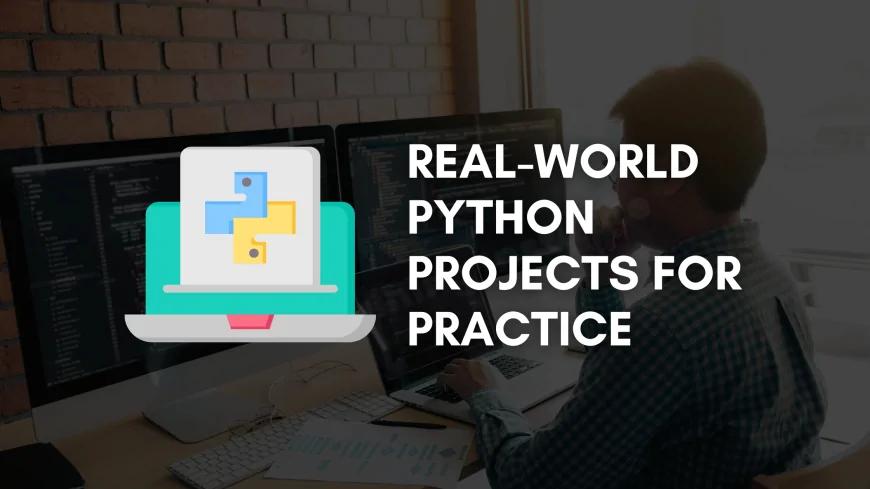Where to Find Real-World Python Projects for Learning | Beginner to Pro
Discover the best sources for real-world Python projects to boost your skills. Ideal for beginners, intermediates, and pros looking to learn by doing.

Learning Python is only the beginning of your journey as a developer. The real challenge is transitioning from tutorials to solving real-world problems. While syntax and basic coding exercises help build foundational skills, hands-on experience with real projects transforms you into a confident, job-ready programmer. But the question is: where do you find meaningful Python projects that simulate real-world scenarios? In this blog, we'll explore various unique platforms and resources where you can find high-quality, real-world Python projects that will accelerate your learning and help you build a strong portfolio.
GitHub Repositories with Project Labels
GitHub is not just a code hosting platform; it's a treasure trove of real-world Python projects. By searching for repositories labeled with terms like good first issue, help wanted, or bug, you can find beginner-to-intermediate level projects that you can contribute to. Open-source contributions improve your coding skills and show potential employers that you’ve worked on collaborative, version-controlled projects.
Pro Tip: Search by topics like Python web scraping, Python automation, or data analysis to discover projects in your area of interest.
Reddit Communities for Developers
Subreddits like r/learnpython, r/Python, and r/dailyprogrammer often host discussions where users share interesting projects and code challenges. You’ll find users posting their real-world problems and asking for Python-based solutions—an ideal opportunity to jump in and practice problem-solving.
What makes it real-world? These are actual issues faced by people, giving you an authentic sense of how Python is used outside textbooks.
Issue Trackers of Open-Source Projects
Popular open-source projects maintain a list of open issues. Projects like Flask, Pandas, or Django have beginner-friendly tags and detailed instructions to help new contributors get started. You can pick an issue and submit a pull request after solving it. This teaches you how to read and understand someone else’s code, a crucial real-world skill.
Why this matters: Learning to collaborate on real software with documentation, modular code, and complex structures prepares you for professional development.
Hackathons and Coding Challenges Platforms
Websites like Devpost, HackerEarth, and Kaggle frequently host hackathons and challenges where participants are given real-world problems to solve. The entries are often open-source, allowing you to study others' solutions and even collaborate on them post-competition.
Bonus: These projects are often reviewed by professionals and come with prize incentives, offering motivation and networking opportunities.
Freelance Job Boards for Practice
While you might not yet be a professional freelancer, platforms like Upwork, Freelancer, and PeoplePerHour post project descriptions that detail exactly what a client needs. Even if you don’t apply, you can treat those job listings as mini project ideas.
Use Case: See a request for a Python script that automates Excel reports? Build it on your own and add it to your portfolio!
API Marketplaces
APIs are everywhere, and using them is a common task in real-world Python development. Sites like RapidAPI or ProgrammableWeb offer APIs you can integrate with Python. Projects like building a weather dashboard, integrating with Twitter, or automating emails become possible and highly relevant to professional workflows.
Skill Set Gained: API interaction, JSON parsing, error handling, and building full-stack mini-apps.
Real Data Portals and Datasets
Platforms such as data.gov, Kaggle Datasets, and UCI Machine Learning Repository offer real-world data you can use for Python projects. Analyzing these datasets using Pandas, Matplotlib, or Seaborn gives you practical experience with data wrangling and visualization.
Project Ideas: Analyze air quality trends, build a COVID-19 dashboard, or automate a report generation system.
Automation of Daily Tasks
Real-world projects don’t always have to come from external sources. Think of repetitive tasks you perform daily—renaming files, scraping job listings, sending emails, or generating reports. Turn these into Python projects. These types of automation projects simulate what many companies need on a daily basis.
Example Project: A script that automatically renames and organizes your downloaded files by type.
Community-Driven Project Ideas
Communities like Dev.to, Medium (Programming Tags), and Hashnode offer blog posts filled with project ideas often inspired by real-world scenarios. These blogs usually come with problem statements, design considerations, and code snippets.
What makes this great: These are problems others have solved or are trying to solve, which gives you context and practical angles to approach them.
Volunteer for Non-Profits or Small Businesses
Reach out to local NGOs, non-profits, or small businesses that may need help automating tasks, organizing data, or improving their online presence. Volunteering your Python skills provides real-world experience and can lead to recommendations or portfolio pieces.
Example: Automating donation receipt generation or creating a visitor log dashboard.
YouTube Channels with Real-World Builds
Some YouTube content creators go beyond tutorials and dive into real applications of Python—building games, web apps, data dashboards, or automation scripts. Follow along or improve their projects to learn hands-on.
Bonus Tip: Try recreating the project without watching the video a second time—this tests your understanding and memory.
Code Review Platforms
Websites like CodeReview.StackExchange allow users to post code snippets for review. You can learn by reading through critiques of other people’s Python code and even post your own for feedback.
Skill Benefit: You learn optimization, best practices, and clean code—all essentials in real-world development.
Collaborative Projects with Peers
Partner with fellow learners and build projects together. This teaches version control, communication, code merging, and collective brainstorming. It’s the closest simulation to a real dev team you'll experience during learning.
Suggestions: Build a task manager app, a budget tracker, or a chatbot.
Interactive Coding Platforms
Sites like Replit and Glitch allow you to build and deploy Python apps in the cloud, often collaboratively. Use these to prototype and share your real-world apps, test ideas quickly, and learn deployment.
Key Benefit: You practice real-time collaboration, deployment, and debugging.
Personal Life Logs or Dashboards
Use Python to track your habits, expenses, workouts, or even sleep patterns. These projects may be personal, but they reflect real use cases for automation, data tracking, and visual reporting.
Idea: A Python dashboard with graphs showing your monthly expenses and savings ratio.
FAQ's
1. Where can I find real-world Python projects to practice in Pune?
Many Python training institutes in Pune offer capstone projects and industry-based case studies as part of their curriculum. These hands-on projects are designed to simulate real-world applications, giving learners practical exposure while strengthening their resumes.
2. Do Python courses in Pune include live project experience?
Yes, reputable Python courses in Pune often include live projects such as web apps, automation tools, and data analytics dashboards. These practical sessions help bridge the gap between theory and job-ready skills.
3. How do Python training institutes in Pune ensure industry relevance?
Top training centers collaborate with industry mentors and regularly update course modules to reflect current trends. Real-time project assignments, hackathons, and portfolio development are built into the training for job market relevance.
4. Are the real-world Python projects beginner-friendly?
Yes. Projects start with beginner-level applications like calculators and file organizers and gradually scale up to real-time tools such as web scrapers or REST APIs. These are guided by trainers, ensuring learners aren’t overwhelmed.
5. Can real-world Python projects boost my resume?
Absolutely. Showcasing real projects from a Python course in Pune demonstrates applied skills and problem-solving abilities, helping you stand out during job interviews and portfolio reviews.
6. What types of projects do Python students work on?
Students often build projects in automation, data analysis, web development (using Flask or Django), and even basic machine learning models. These projects simulate actual workplace tasks, preparing learners for job roles.
7. How many projects should I complete during a Python course?
A strong Python course in Pune usually includes 4–6 hands-on projects across different domains. Completing them enhances understanding and boosts confidence to take on freelance or job-level responsibilities.
8. Are these projects evaluated or just for practice?
Yes, projects are typically evaluated by trainers or mentors. Constructive feedback helps learners understand their mistakes and improve code quality — essential for professional-level development.
9. What career roles do these projects prepare me for?
These Python projects are designed to prepare students for roles like software developer, data analyst, Python automation engineer, and backend developer — all in high demand across IT sectors in Pune.
10. Will I work on projects independently or in groups?
Both formats are common. Group projects foster collaboration, mimicking team-based development environments, while solo projects strengthen individual problem-solving skills — both essential in professional roles.
11. How long does it take to complete these real-world Python projects?
Project durations vary from 1 week for small apps to 3–4 weeks for capstone-level tasks. Most Python training courses in Pune schedule them at regular intervals to ensure balanced progress.
12. Do institutes provide mentorship during project work?
Yes, mentorship is a key course highlight. Expert guidance helps clarify concepts, debug errors, and align the project with industry expectations — ensuring better learning outcomes.
13. Can I showcase these projects on GitHub or LinkedIn?
Definitely. Python training institutes in Pune encourage students to publish their work on GitHub and LinkedIn, showcasing code proficiency and enhancing digital portfolios for recruiters.
14. Are there Python internships available in Pune after course completion?
Many institutes help students land internships or freelance roles where they continue working on real-world projects, applying skills learned in class to professional scenarios.
15. Do Python training programs include domain-specific projects?
Yes. Depending on the student's interests, projects can focus on domains like finance, e-commerce, health tech, or logistics, offering targeted experience for domain-specific career goals.
16. Are there assessments based on project performance?
Often, yes. Performance in real-world Python projects contributes to your final assessment or certification. This ensures you're not just attending classes but actively applying your skills.
17. Is any prior coding experience needed to start real-world projects?
Not always. Courses are structured to build up from basics, gradually introducing you to complex real-world problems. So even non-programmers can start working on projects after a few weeks of training.
18. Can these projects help with freelancing opportunities?
Absolutely. The ability to build practical Python applications is highly valuable for freelance clients. Many learners in Pune use their course project portfolio to land freelance gigs or side hustles.
19. How do I know if the project is relevant to current job markets?
Python training institutes in Pune design their project modules based on job trend analysis and input from industry professionals, ensuring every assignment reflects real-world applicability.
20. Can I get career guidance along with Python project work?
Yes. Alongside technical training, most institutes in Pune offer career counseling, mock interviews, and resume workshops to help learners transition smoothly into the job market.
Practice is the Real Teacher
You can read dozens of books and watch countless tutorials, but building real-world Python projects is what solidifies your skills. Whether it's through contributing to open-source, automating tasks, or helping a local business, these projects prepare you for what the industry truly expects.
Start small, aim for consistency, and let curiosity drive you. Before you know it, your portfolio will reflect not just knowledge—but real experience, making you stand out in the job market.
What's Your Reaction?
 Like
0
Like
0
 Dislike
0
Dislike
0
 Love
0
Love
0
 Funny
0
Funny
0
 Angry
0
Angry
0
 Sad
0
Sad
0
 Wow
0
Wow
0















